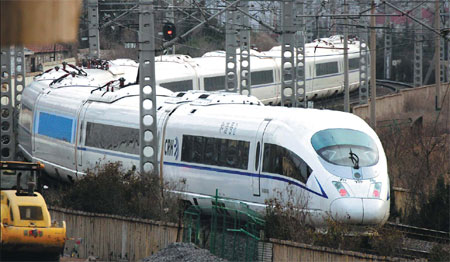
China's railway network makes a massive contribution to both the economy and society, which has prompted many observers to urge caution over introducing further reforms to the system. Huang Jiexian / for China Daily
However, any suggestion of an increase in the costs for passengers was dismissed by the NDRC last month. In a statement, the country's economic planner vowed that train stations nationwide will continue to charge according to government-set prices.
Still, some experts argue that a more effective pricing system will help the railways to better cater to the market and improve efficiency.
In a commentary published by Caijing magazine on April 1, Li Lin, who before the recent shakeup was a researcher at the ministry's Economic Planning Institute, agreed with the belief that an administrative body should be responsible for setting ticket prices, rather than the corporation or any other commercial operation, due to the impact it would have on the cost of commodities. Yet, he said, that does not mean prices should be fixed regardless of market demand.
"There should be a revision to the regulations that make sure prices cover the operating costs of the company and also stay within reach of the spending power of the average passenger," he wrote.
Li conceded that railway operators should get some say in determining the costs of passenger tickets and freight costs.
Despite the NDRC statement, a price hike at some point in the future is inevitable. "The cost of resources is rising, and will keep doing so, and there is no exception for railway transport," Zhang said.
The only way to constrain costs and avoid hitting passengers in the pocket, he added, is "if other modes of transport, such as air travel or highways, start to play a larger role".
China's 12th Five-Year Plan (2011-15) states that authorities will expand the national highway network by 25,000 km, bringing the total to about 83,000 km, as well as build 82 airports and expand 101 more by 2015.
The plan also sets out to solve the lack of cohesion between different modes of transport and promote hubs. (This month the State Council approved a pilot zone aimed at boosting the airfreight sector in Zhengzhou, capital of Henan province.)
However, the concern over ticket prices that erupted after the dismantling of the ministry shows, according to experts, that the reform will need to carefully balance public interest with the desire to make a profit.
"Under the old system, losses from public transport were offset by revenues from freight. As a commercial enterprise, the China Railways Corporation will be unwilling to continue to take the losses," said professor Zhao Jian at Beijing Jiaotong University.
"The problem can only be solved through subsidies from the State," he added. "The problem is, how much should those subsidies be?"

Copyright ©1999-2011 Chinanews.com. All rights reserved.
Reproduction in whole or in part without permission is prohibited.